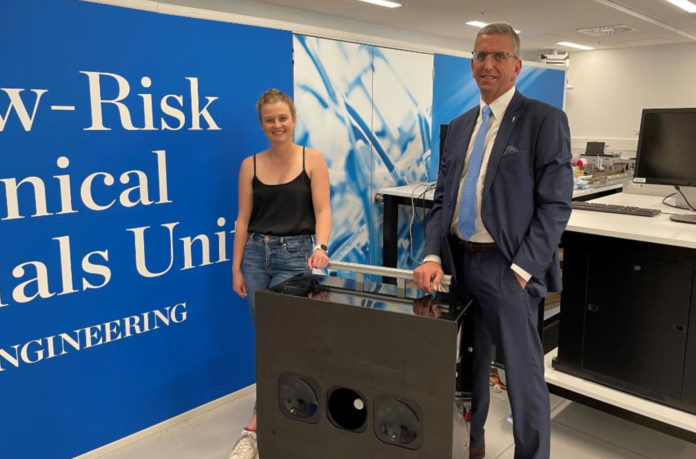University of Canterbury PhD student, Jessica Fitzjohn, is developing a new prize-winning tool for breast cancer diagnosis, which aims to break down the socio-economic, cultural and accessibility barriers of breast-screening.
A Mechanical Engineering doctoral candidate, Ms Fitzjohn is working on a more accessible, comfortable, and ergonomic approach that achieves results with similar accuracy to routine mammography and could potentially be delivered at local health centres without specialist staff.
She is part of the research team working alongside Tiro Medical on a breast cancer-diagnosis device with the potential to help overcome cultural and socio-economic boundaries, reach more rural communities, and make breast screening more accessible to women of all ages.
Following her success gaining third place in the national Falling Walls Lab competition, run by the Royal Society Te Apārangi, Fitzjohn hopes this new breast-screening method could become a reality in Aotearoa.
The new method involves lying face down while the device vibrates at different frequencies for cameras to capture surface motions. The images are then analysed to detect possible tumours.
“Up to now, this method of testing has been just as effective as asymptomatic mammography in finding early stages of cancer, capturing tumours as small as 7.5mm – smaller than a coffee bean,” Ms Fitzjohn says.
“Currently, free mammograms are offered to women aged 45-69 in New Zealand, but only 67% of women in that age group make the most of this. Many women put off coming in for mammography because they find it uncomfortable and invasive.
“In addition, almost 20% of breast cancers occur in women under 45, who aren’t eligible for the free programme and for whom mammography is not generally recommended.”
Mammograms can cost $200 (unless referred by a doctor) at breast clinics and radiology clinics.
“This method of testing wouldn’t require a skilled person to do it. We’re designing it to be automated so the patient could just come in, lay on the machine, and press a button to start the test. No-one else would have to be there and the testing will be much more comfortable, which will hopefully make it more attractive to people,” she says.
An automated machine would make a difference to wait times for results too, with the outcome almost immediate, compared to the current wait of a couple of weeks for mammogram results.
Testing with a local GP at a primary health care centre would make a difference for women throughout Aotearoa, particularly those in rural and remote communities, where travelling into a city to get a mammogram may be difficult, she said.
Her PhD supervisor, University of Canterbury Distinguished Professor Geoff Chase, is involved with other innovative projects which are making a difference in the healthcare industry using engineering methods.
Professor Chase says he is delighted to collaborate with her on this important research.
“Jessie is tackling a big topic and achieving bigger results in a time where the impact of inequality and the injustice arising from poor equity of access to care is more visible than ever,” he said.
“This technology could make a significant difference for women in New Zealand, not only making testing for breast cancer far more accessible and less daunting, but also drastically cutting the costs of screening.”
Ms Fitzjohn says it would also have sizeable financial benefits. In New Zealand, breast cancer is the most expensive cancer, with aspects such as treatment and biopsies costing around $76 million per year, not including $40m spent on breast screening.
“If we can get something that doesn’t need skilled trained radiologists and can be automated, then hopefully we can catch some of those cancers and make the treatments low-cost.”
The focus is now on gaining funding for another clinical trial, which would make a big difference in learning the necessary methods to socialise the tool.
“As we’ve just got on a bit more of a roll and getting more meaningful results it’d be cool to look into a way I can keep going after I finish my PhD. If the opportunity crops up to do further research, I’d be very keen to take this project further.”




